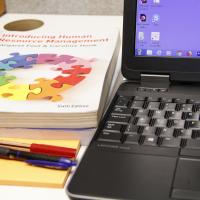
School of Medicine and Biosciences subject guide
Welcome video
Welcome to your library guide for the School of Medicine and Biosciences. My name is Dr Janice Fernandes and I am your subject librarian. I am here to support you throughout your course and teach you the skills you need to effectively find relevant information for your studies. You can contact me via any of the below methods:
- Email: Janice.fernandes@uwl.ac.uk
- Phone: 02082312151
- MS Teams: Search for Janice Fernandes
Specialist sources
In addition to using LibSearch, there are specialist sources you can use to find additional information specific to your subject. Below are the ones I would recommend for your studies (please note, you will need to log in with your student username and password for some of the links below):
-
Academic Search Elite
General research database covering academic subjects such as computer science, chemistry, sociology, economics and psychology. Information is available from 2,100+ full text journals and indexing and abstracts for another 3,650 titles.
- Find out more on the UWL Library Services login page
-
British National Formulary
The nationally recognised source of information on medicines and their use. There is also the BNF for Children. Jointly produced by the British Medical Association and the Royal Pharmaceutical Society. It is revised biannually.
- Find out more via the BNF Publications page
-
CINAHL (Cumulative Index to Nursing and Allied Health Literature)
The principal journal reference database for nursing, medicine and biosciences including dementia studies. It includes details of items covering all aspects of nursing and allied health, as well as related topics such as consumer health, law and health and health promotion.
- Find out more via the EBSCOhost website
-
Cochrane Library
One of the premiere sources of current knowledge in all aspects of healthcare. It includes the Cochrane Database of Systematic Reviews, The Cochrane Register of Clinical Trials and appraisals of both systematic reviews and clinical trials in all fields of healthcare.
- Find out more via the Cochrane Library website
-
Embase
Covers all aspects of clinical medicine, biomedicine, nursing, dentistry, allied health, health policy, genetics etc. A good complement to Medline.
Find out more via the UWL Library Services login page
-
Medline (EBSCO)
The most comprehensive and highly-regarded database indexing and abstracting the journal literature in clinical medicine, biomedicine, nursing, dentistry, allied health, health policy, genetics etc. Produced by the U.S. National Library of Medicine, it covers more than 5,500 journal titles in over 40 languages from 1948 onwards.
- Find out more via the portal login page
-
PsychINFO
The most comprehensive database covering psychiatry, psychology, behaviour and all aspects of mental health.
Find out more via the UWL Library Services login page
-
PubMed
Public access version of Medline from the National Library of Medicine. Primarily a citation database, coverage includes over 22 million citations to the medical and biomedical literature.
- Find out more via the PubMed website
-
ScienceDirect
Access to over 2000 full text e-journals published by Elsevier in range of subjects including Nursing, Medicine, Forensic Science, Chemistry, Computer Science, Engineering, Biochemistry, Immunology and Microbiology, Pharmacology, Toxicology, Arts and Humanities, Business, Management, Psychology and Social Sciences. UWL does not subscribe to all journals on Science Direct and unsubscribed journals are not available in full text.
- Find out more via the portal login page
-
Scopus
Scopus is the largest abstract and citation database, including peer-reviewed titles from international publishers, Open Access journals, conference proceedings, trade publications, quality web sources and subject coverage for the following: Chemistry, Physics, Mathematics and Engineering, Life and Health Sciences, Social Sciences, Psychology and Economics, Biological, Agricultural and Environmental Sciences.
- Find out more via the portal login page
Referencing
When writing assignments, you need to acknowledge your use of another author's ideas so that you:
- Give the original author credit
- Support your arguments
- Enable the reader to find your sources
- Prove to your lecturer that you have read around the subject
- Avoid accusations of plagiarism
Accurate referencing will help you avoid accusations of plagiarism and possible loss of marks.
Your referencing style for your assignments is Harvard Cite Them Right.
- For more information, visit the completing your assignments page
Books and key shelfmarks
We have a wide range of material to support you both within the Paul Hamlyn Library and via the Digital Library.
Search LibSearch to discover books and ebooks on your topics. For some titles, we will have them in both printed and ebook formats.
Paul Hamlyn Library
The majority of the material for Biomedical titles can be found on the 2nd floor of the Library under the shelfmarks of 610-616. However, some titles can also be found with shelfmarks 570-576 and 362-363.
The books can be borrowed for one week but will automatically renew each week for the length of your course unless someone else requests them.
Ebooks
There is a wide range of ebooks available for you to read via LibSearch and your reading lists. Follow the link within LibSearch or your reading list to access the ebook via the online ebook reader.
Searching for information
Basic search strategies (part 1)
Basic search strategies (part 2)
Evaluating your search results
- For more information, please visit the completing your assignments page
Practice exercises
Below are some exercises to help you to get familiar in searching for information using the Library sources:
-
LibSearch
LibSearch is available from the Library homepage and allows you to search for information on your keywords that has been published in journals, books, reports, etc. It is important to be confident in using the "All filters" section to enable you to narrow down the results to the most useful ones to read.
Use the below steps to search LibSearch and answer the questions below:
- Use the filters menu to narrow down to:
- date range last 12 months
- academic journals
Questions:
Who wrote the article ‘Nutrition Interventions Are Needed for Dementia Informal Caregivers’?
What year was it published?
What journal was it published in?
- Use the filters menu to narrow down to:
-
Ebooks
Ebooks are accessible via LibSearch.
The best way to find them is to:
- Search for keywords that describe your topic, for example: "stop and search"
- Within the "All Filters" option, narrow down to:
- Ebook
- Full Text Online
- Limit your search by date (last 12 months, last three years) to find only the most recently published books
When you have found a book to read, you have the option to read it online. Be sure to sign out of the book once you have finished looking at it.
Questions:
- Find the e-book ‘Writing for Biomedical Sciences Students’
- How many pages can you copy of the book? (Hint: this information is on the page before you 'read online')
- Does this book mention scientific thinking? (Hint: use the 'search within book' search box)
-
Journals
Journals are incredibly rich in content and you will find them useful for your course throughout your studies. The Library subscribes to thousands, so it is important to be able to find the relevant ones for you. If you don't have a particular title you want to find, you can search via keyword in LibSearch. If you are looking for a specific one, then you can use the e-journals search on the library home page.
Use the below steps for journals and answer the questions below:
Enter into LibSearch the title of the journal you are looking for, for example "Alzheimer's & Dementia: The Journal of the Alzheimer's Association"
Look at the date range that is available for the journal
Questions:
What is the oldest year that is available for Alzheimer's & Dementia: The Journal of the Alzheimer's Association?
Open the journal and browse to 2021. How many issues were published that year?










